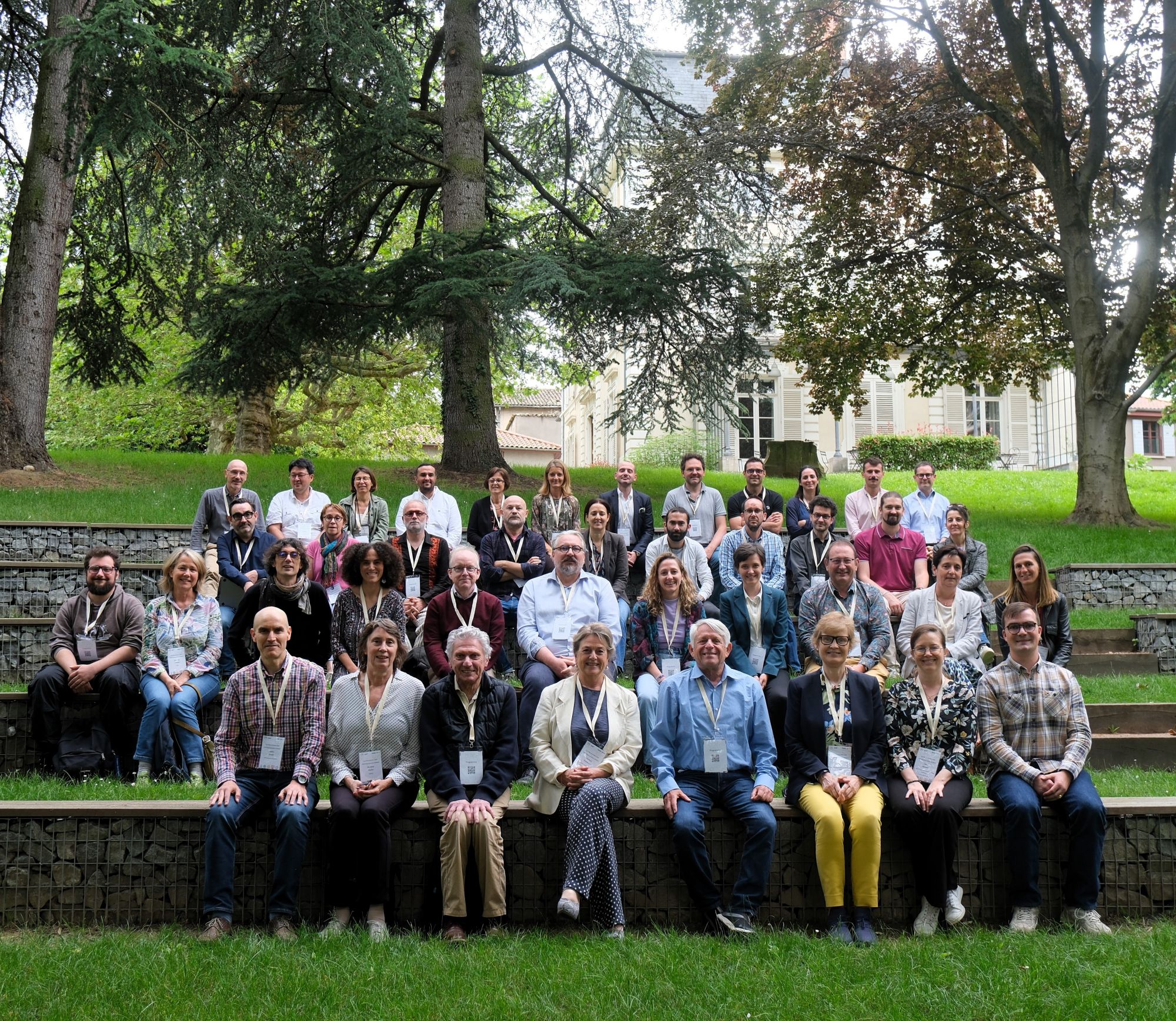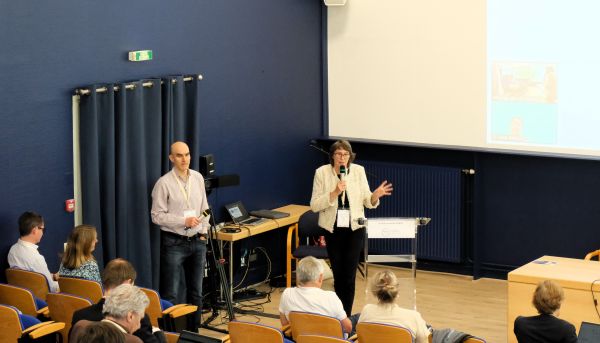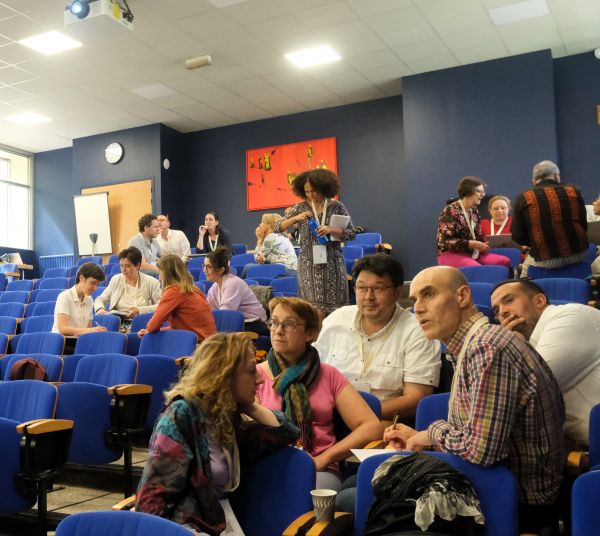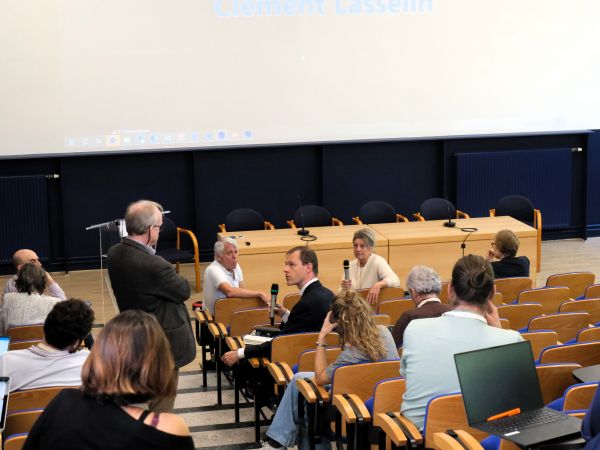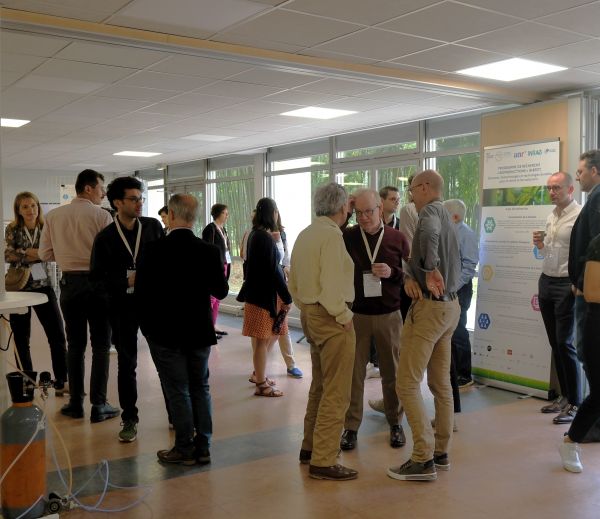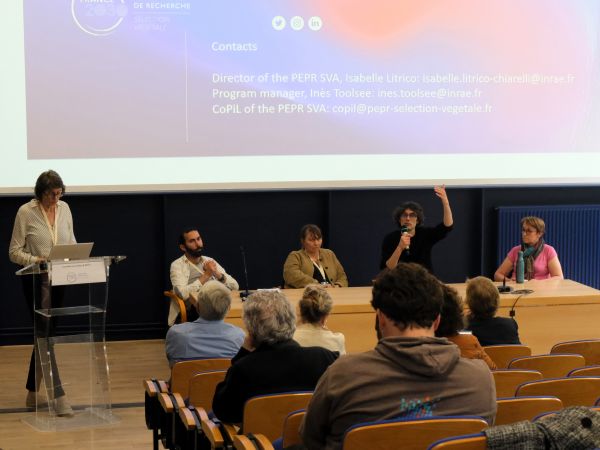A UNITED COMMUNITY
The 2024 B-BEST annual conference gathered around sixty representatives of the scientific community involved in research on biomass, its transformation, biotechnologies, and bio-based chemistry.
These days provided an opportunity to discuss the challenges, opportunities, and expectations driven by the transition to a responsible bioeconomy. All targeted projects of the program, divided into five thematic axis, were able to present their work, share their challenges and ambitions in their respective fields, and initiate some scientific collaborations.
This event was also an opportunity to invite the program's governance committees, representatives of socio-economic actors, partner research institutes, and various experts whose multidisciplinary contributions allowed for mutual enrichment.
The program directors, Monique Axelos (INRAE) and Abdelhakim Koudil (IFPEN).
HIGHLIGHTS
Biotechnologies and the bioeconomy
Biotechnologies, particularly bio-based chemistry, represent a significant development area for existing industries and are a necessary lever for the development of a large-scale bioeconomy through the collaboration and transfer of research results such as those expected in the B-BEST program:
- The company Axens, a major industrial player in France in bio-based chemistry processes, was able to report on the progress of work in the private sector, from development to commercialization, highlighting both the success factors and the current obstacles depending on the countries where their industrial projects are located and the resources available on-site.
From development to commercialization Key success factors (Axens company)
The bioeconomy and the biotechnologies that underpin it have been a field of research invested in for many years, in France and many other countries:
- Regarding France, a panel of research projects funded by the French national research agency (ANR), at various stages of progress, was presented, as well as ANR's funding policy in this area.
- The presence of an international scientific committee member, Anne Meyer, who came especially from Denmark, allowed for the discovery of the research areas invested in at the Technical University of Denmark in the field of new processes and bioproducts through enzymatic catalysis.
A socially responsible bioeconomy
The B-BEST program includes a research axis dedicated to humanities and social sciences, which was presented in detail on Wednesday, June 12. Its goal is to develop a multidisciplinary study and support framework encompassing the program's work, to articulate the tools and methods of industrial biotechnologies developed with the philosophical, ethical, and socio-economic challenges inherent in the transition to a responsible bioeconomy.
To deepen these issues, two conferences were proposed:
- A member of the international scientific council of Delft University of Technology, Patricia Osseweijer, presented her work on inclusivity as a prerequisite for scientific research to ensure local and global social justice in its impacts.
- The "Biomass & SHS" working group also presented its work and clarified its orientations regarding the contribution of humanities and social sciences to research on the bioeconomy and biotechnologies : Manifesto of the Biomass & SHS collective (in french) (contact: biomasse_shs@groupes.renater.fr).
The session ended with a roundtable discussion on the question: "Is a responsible bioeconomy viable?" Bringing together experts in humanities and social sciences, including philosophy, forestry science, and ecological transition, these discussions allowed for a candid collective reflection on the scientific challenges and orientations necessary for a transition to a viable model, particularly concerning the availability of biomass.
Support for research
Scientific work with high socio-environmental impact, such as that conducted in the B-BEST program, benefits from tools for scientific structuring, administrative, or financial support.
At the European level:
- Many mechanisms support large-scale projects. They were presented by a representative of INRAE's dedicated service. She detailed, among other things, the various project funding tools currently available within the Horizon Europe 2021-2027 framework.
- At the operational research support level, the European-scale research infrastructure IBISBA was presented. It aims to facilitate cooperation between European countries to promote the development of biotechnologies for industry. The B-BEST program has been tasked with supporting the creation of this infrastructure.
At the national level:
- Technology transfer is central to the B-BEST program as it is integrated into the national acceleration strategy "Bio-based Products and Industrial Biotechnologies - Sustainable Fuels" of the France 2030 plan. The scientific community present was thus able to benefit from presentations of several pre-maturation and maturation project mechanisms, notably by the BIOSCALE consortium and the 3BCAR Carnot Institute , enabling the scaling-up of innovations and technologies developed within the program.
OTHER ROUNDTABLES AND WORKSHOPS
Workshop: Life Cycle Analysis (LCA) is a project design approach that is rapidly developing. Indeed, it is based on a broad assessment of environmental impacts and must be conceived at the project's inception to benefit from rigorous measurement, allowing for maximum reduction of these impacts. This session was enriched by a practical workshop. Divided into small working groups, the present community was able to practice this method through a case study, followed by a collective discussion on the various proposals.
Roundtable: Finally, the sharing of knowledge, the search for synergy, and the complementarity of research work are crucial elements in implementing relevant and effective solutions, four other PEPR research programs were invited to present their projects and ambitions before collectively discussing possible collaborations.
The represented programs:
- Carbon and Continental Ecosystems (FairCarboN);
- Advanced Plant Breeding (SVA);
- Forest Resilience (FORESTT);
- Decarbonization of Industry (SPLEEN).
B-BEST targeted projects
The B-BEST program consists of 11 targeted projects aimed at addressing the main scientific and industrial scale-up challenges to implement the transition to a responsible bioeconomy.
These 11 projects were able to detail their work areas and the progress of their work since the scientific launch of the program on July 11. Find them at the following link:
THANKS AGAIN TO THE PARTICIPANTS!





